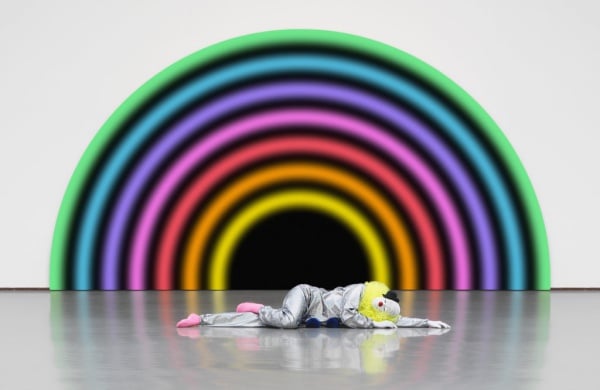
Visitors to Art Basel in Miami Beach this December will do well to pencil in a visit to the Bass Museum of Art in Miami Beach—or simply “The Bass,” as the institution has rebranded itself. The new name (which comes with a new logo and website) is not the only major change at the Bass, which will unveil its newly-transformed space on December 1, timed to the fair, with solo exhibitions by Ugo Rondinone, Mika Rottenberg, and Pascale Marthine Tayou.
The current $12 million project kicked off in 2013, led by Arata Isozaki and David Gauld, who were responsible for the museum’s last expansion, in 2001, and have worked together on project in New York at Lincoln Center’s Avery Fisher Hall and the Brooklyn Museum auditorium.
The redesigned Bass will have nearly 50 percent more exhibition space, even though the exterior footprint of the building hasn’t changed—it is more efficiently designed this time around.
Rendering of newly transformed exterior of the Bass in Miami Beach by Arata Isozaki and David Gauld. Rendering © David Gauld Architect (2016). Courtesy of the Bass, Miami Beach.
“We pretty much gutted it out and reconfigured most of the downstairs spaces,” said Silvia Karman Cubiñá, the museum’s executive director and chief curator, in a phone conversation with artnet News. “It’s actually a very sustainable way to expand. In response to the very expensive building projects of the past, I think a lot of museums are looking at how to reconfigure their spaces and make them more efficient for programming.”
Gone is the massive multi-level ramp that ate up part of the lobby and a great deal of prime exhibition space. In its place are two galleries. The museum has also enclosed two outdoor terraces that were unusable half of the year, thanks to the Miami heat. The redesign also triples the museum’s education space. A new wing with a separate entrance, dubbed the Creativity Center, will open in spring 2017, and will be the largest museum education facility in the Miami-Dade county.
“I think the most impactful change in this remodeling will be the public spaces,” Cubiñá added. “There’ll be a large lobby, a café, a shop.” She noted that the perceived purpose of museums has changed since the last renovation, and that the idea of museum as a kind of church, quiet and sacred, has become outdated.
Mika Rottenberg, NoNoseKnows (Pearl Shop Variant), 2015. Courtesy of Mika Rottenberg and the Bass, Miami Beach.
The new, shorter name is also meant to be a more accurate reflection of the public’s relationship with the institution. “That’s what people call us!” exclaimed Cubiñá.
Over the long, 18-month closure, the museum has continued its education programming at the Miami Beach library, located across the street. The library has also held off-site exhibitions for the museum, and the Bass still hosted Art Basel Public outside in Collins Park in December.
For the reopening, Rondinone, in his first solo museum show in the US, will take over the Bass’s second floor. The Rottenberg exhibition will include the US premiere of NoNoseKnows, a hit at the 56th Venice Biennale, while Tayou will create a site-specific work, Welcome Wall, as part of his show.
“I truly believe these three artists really reflect the diversity of Miami Beach and also the international character of our city,” said Cubiñá. “We have a good long fall to prepare for all of these exciting things.”